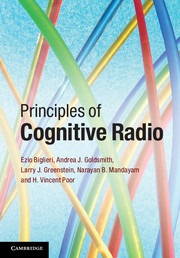Description
Principles of Cognitive Radio
Authors: Biglieri Ezio, Goldsmith Andrea J., Greenstein Larry J., Mandayam Narayan B., Poor H. Vincent
Expert authors draw on fundamental theory to explain the core principles and key design considerations for developing cognitive radio systems.
Language: English
Subject for Principles of Cognitive Radio:
Approximative price 68.67 €
In Print (Delivery period: 14 days).
Add to cart
Publication date: 11-2012
321 p. · 18.1x25.4 cm · Hardback
321 p. · 18.1x25.4 cm · Hardback
Description
/li>Contents
/li>Biography
/li>
Widely regarded as one of the most promising emerging technologies for driving the future development of wireless communications, cognitive radio has the potential to mitigate the problem of increasing radio spectrum scarcity through dynamic spectrum allocation. Drawing on fundamental elements of information theory, network theory, propagation, optimisation and signal processing, a team of leading experts present a systematic treatment of the core physical and networking principles of cognitive radio and explore key design considerations for the development of new cognitive radio systems. Containing all the underlying principles you need to develop practical applications in cognitive radio, this book is an essential reference for students, researchers and practitioners alike in the field of wireless communications and signal processing.
1. The concept of cognitive radio; 2. Capacity of cognitive radio networks; 3. Propagation issues for cognitive radio; 4. Spectrum sensing; 5. Spectrum exploration and exploitation.
Ezio Biglieri is an Adjunct Professor at the Universitat Pompeu Fabra, Barcelona, Spain, University of California, Los Angeles and King Saud University, Riyadh, KSA.
Andrea J. Goldsmith is a Professor of Electrical Engineering at Stanford University, California.
Larry J. Greenstein is a Research Associate at the Wireless Information Network Laboratory, Rutgers University, New Jersey.
Narayan B. Mandayam is a Professor and the Peter D. Cherasia Faculty Scholar at Rutgers University, New Jersey.
H. Vincent Poor is the Dean of Engineering and Applied Science and Michael Henry Strater University Professor of Electrical Engineering at Princeton University, New Jersey.
Andrea J. Goldsmith is a Professor of Electrical Engineering at Stanford University, California.
Larry J. Greenstein is a Research Associate at the Wireless Information Network Laboratory, Rutgers University, New Jersey.
Narayan B. Mandayam is a Professor and the Peter D. Cherasia Faculty Scholar at Rutgers University, New Jersey.
H. Vincent Poor is the Dean of Engineering and Applied Science and Michael Henry Strater University Professor of Electrical Engineering at Princeton University, New Jersey.
© 2024 LAVOISIER S.A.S.
These books may interest you

Fundamentals of Cognitive Radio 126.53 €



